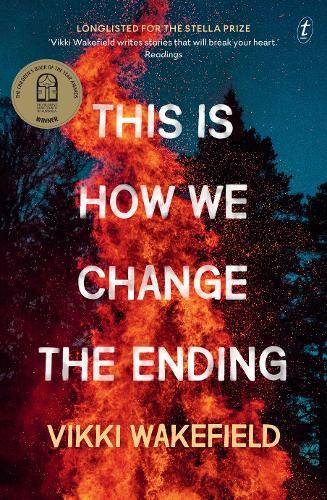Author: Vikki Wakefield
Publisher: Text (2019)
Genre: Contemporary fiction (for a young adult readership)
“Nate McKee is doing his best to be invisible. He’s worried about a lot of things – how his dad treats Nance and his twin half-brothers; the hydro-crop in his bedroom; his reckless friend, Merrick. Nate hangs out at the local youth centre and fills his notebooks with things he can’t say. When some of his pages are stolen, and his words turn up as graffiti on the centre, he realises he has allies. He might be able to make a difference, change his life, and claim his future.

ID: Night sky with flames in the middle of the page. The title is capitalised in white text.
Or can he?”
I jumped on the Twitter bandwagon and asked 12 people to recommend a book for me to read this year. This Is How We Change The Ending was recommended by DireleafeHall and since it’s been on my TBR for a while, I knew I wanted to start my reading year with it. And I’m a Vikki Wakefield convert! Going to put Ballad for a Mad Girl on hold at the library asap!
There’s so much I could say about this book! The difference between Nate at the beginning and Nate at the end was remarkable. He’s the same person, certainly, but his perspective has changed. Instead of sitting on the sidelines of his life, he started to take action. One moment, one choice, at a time. His family remained one of the most significant parts of his life (especially Jake and Otis, his brothers) but the way he related to them shifted.
Before the attack at the youth centre, Nate was a passive member of his own family (and his life). His fear of Dec (whom he wasn’t allowed to call dad) never disappeared, but his willingness to be defiant increased. Otis, in particular, was part of that. Otis had an undiagnosed disability (perhaps autism?) and Dec had an ableist attitude towards him, which Jake (Otis’ twin) began to emulate. In contrast, Nate took care of Otis as much as he could. My favourite piece of Nate’s writing was about Otis – how Otis was special and important not in spite of his disability, but because of it: “What if natural selection/ chose someone like you?” One of the pivotal moments in Nate’s growth was when Otis was sick, and Nate sought out Dec for assistance – putting his loyalty and concern for Otis above his fear of Dec.
Aside from Nate, my favourite character was Mr. Reid. He reminded me of Robin Williams’ character in Dead Poet’s Society – and Nate made that comparison too. But Mr. Reid wasn’t teaching a group of privileged boys with their careers mapped out, he was trying to support a class of “victims.” “You’re lost,” he told them, “and you’re surrendering the only real weapon you have…while you’re fighting each other something else is being stolen and you don’t even know it.” He saw Nate’s potential, and challenged him to meet it. He was the kind of teacher who doesn’t come along every day, the kind who goes above and beyond to foster the growth of his students. I was lucky enough to have a teacher like that in high school, and I think of him often with gratitude.
A few other side notes: I liked that romance wasn’t a huge part of this novel, unlike a lot of other YA novels. Like Nate, I was far too busy worrying in high school to consider relationships, and I imagine lots of other readers would feel seen in Nate’s experiences too.
I was impressed by how prominent the class divide in Australia was throughout the novel, and it caused me to reflect on my own privilege. There’s a scene where Nate took three buses to meet someone at a cafe and marvelled at the cost of the items on the menu and the contrast between it and the state of the youth centre was striking. Similarly, there was a scene where Nate and some of his classmates went to a careers fair and felt distinctly out of place next to the private school students with expensive uniforms and limitless career prospects. As Nate put it, “they’re free to save the world. The rest of us have to fight our way out of the jungle first.”
It was so hard to pick a favourite line from this book! However, since I’m a worrier like Nate, I decided on this one:
“I think worrying is a form of prayer for people who don’t believe in god.”
And my second favourite line (because I couldn’t stick to just one):
“I write…because I want to remember exactly what it feels like to be me, right now. Otherwise my brain plays tricks – it changes things, normalises things that aren’t normal.”
This is How We Change the Ending was an excellent novel. Nate was a mature young man and his story is sure to capture the hearts and minds of readers everywhere.
You can buy a copy of the novel from Readings independent bookstore’s website.